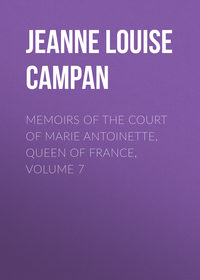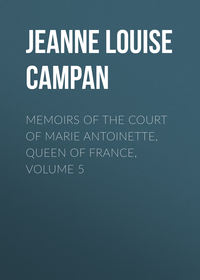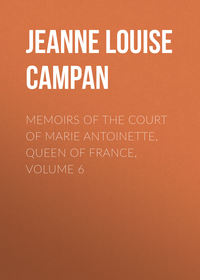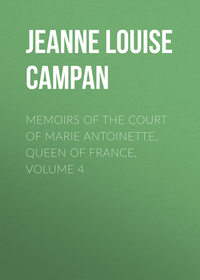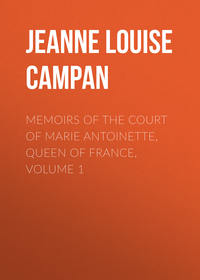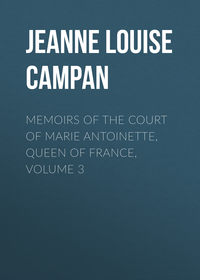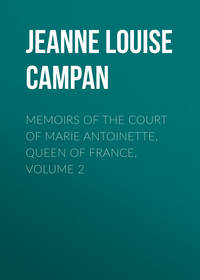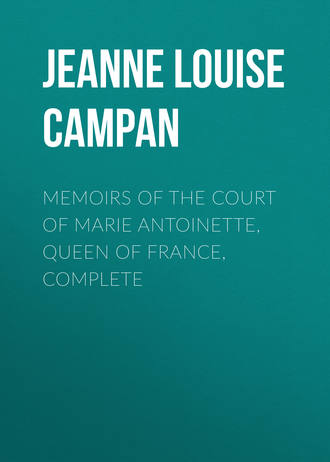 полная версия
полная версияMemoirs of the Court of Marie Antoinette, Queen of France, Complete
In the same year in which Marie Antoinette was married to the Dauphin, Henriette Genet married a son of M. Campan, already mentioned as holding an office at the Court; and when the household of the Dauphiness was formed, Madame Campan was appointed her reader, and received from Marie Antoinette a consistent kindness and confidence to which by her loyal service she was fully entitled. Madame Campan’s intelligence and vivacity made her much more sympathetic to a young princess, gay and affectionate in disposition, and reared in the simplicity of a German Court, than her lady of honour, the Comtesse de Noailles. This respectable lady, who was placed near her as a minister of the laws of etiquette, instead of alleviating their weight, rendered their yoke intolerable to her.
“Madame de Noailles,” says Madame Campan, “abounded in virtues. Her piety, charity, and irreproachable morals rendered her worthy of praise; but etiquette was to her a sort of atmosphere; at the slightest derangement of the consecrated order, one would have thought the principles of life would forsake her frame.
“One day I unintentionally threw this poor lady into a terrible agony. The Queen was receiving I know not whom,—some persons just presented, I believe; the lady of honour, the Queen’s tirewoman, and the ladies of the bedchamber, were behind the Queen. I was near the throne, with the two women on duty. All was right,—at least I thought so. Suddenly I perceived the eyes of Madame de Noailles fixed on mine. She made a sign with her head, and then raised her eyebrows to the top of her forehead, lowered them, raised them again, then began to make little signs with her hand. From all this pantomime, I could easily perceive that something was not as it should be; and as I looked about on all sides to find out what it was, the agitation of the Countess kept increasing. The Queen, who perceived all this, looked at me with a smile; I found means to approach her Majesty, who said to me in a whisper, ‘Let down your lappets, or the Countess will expire.’ All this bustle arose from two unlucky pins which fastened up my lappets, whilst the etiquette of costume said ‘Lappets hanging down.’”
Her contempt of the vanities of etiquette became the pretext for the first reproaches levelled at the Queen. What misconduct might not be dreaded from a princess who could absolutely go out without a hoop! and who, in the salons of Trianon, instead of discussing the important rights to chairs and stools, good-naturedly invited everybody to be seated.
[M. de Fresne Forget, being one day in company with the Queen Marguerite, told her he was astonished how men and women with such great ruffs could eat soup without spoiling them; and still more how the ladies could be gallant with their great fardingales. The Queen made no answer at that time, but a few days after, having a very large ruff on, and some ‘bouili’ to eat, she ordered a very long spoon to be brought, and ate her ‘bouili’ with it, without soiling her ruff. Upon which, addressing herself to M. de Fresne, she said, laughing, “There now, you see, with a little ingenuity one may manage anything.”—“Yes, faith, madame,” said the good man, “as far as regards the soup I am satisfied.”—LAPLACE’s “Collection,” vol. ii., p. 350.]
The anti-Austrian party, discontented and vindictive, became spies upon her conduct, exaggerated her slightest errors, and calumniated her most innocent proceedings. “What seems unaccountable at the first glance,” says Montjoie, “is that the first attack on the reputation of the Queen proceeded from the bosom of the Court. What interest could the courtiers have in seeking her destruction, which involved that of the King? Was it not drying up the source of all the advantages they enjoyed, or could hope for?”
[Madame Campan relates the following among many anecdotes illustrative of the Queen’s kindness of heart: “A petition was addressed to the Queen by a corporation in the neighbourhood of Paris, praying for the destruction of the game which destroyed their crops. I was the bearer of this petition to her Majesty, who said, ‘I will undertake to have these good people relieved from so great an annoyance.’ She gave the document to M. de Vermond in my presence, saying, ‘I desire that immediate justice be done to this petition.’ An assurance was given that her order should be attended to, but six weeks afterwards a second petition was sent up, for the nuisance had not been abated after all. If the second petition had reached the Queen, M. de Vermond would have received a sharp reprimand. She was always so happy when it was in her power to do good.”
The quick repartee, which was another of the Queen’s characteristics, was less likely to promote her popularity. “M. Brunier,” says Madame Campan, “was physician to the royal children. During his visits to the palace, if the death of any of his patients was alluded to, he never failed to say, ‘Ah! there I lost one of my best friends! ‘Well,’ said the Queen, ‘if he loses all his patients who are his friends, what will become of those who are not?’”]
When the terrible Danton exclaimed, “The kings of Europe menace us; it behooves us to defy them; let us throw down to them the head of a king as our gage!” these detestable words, followed by so cruel a result, formed, however, a formidable stroke of policy. But the Queen! What urgent reasons of state could Danton, Collot d’Herbois, and Robespierre allege against her? What savage greatness did they discover in stirring up a whole nation to avenge their quarrel on a woman? What remained of her former power? She was a captive, a widow, trembling for her children! In those judges, who at once outraged modesty and nature; in that people whose vilest scoffs pursued her to the scaffold, who could have recognised the generous people of France? Of all the crimes which disgraced the Revolution, none was more calculated to show how the spirit of party can degrade the character of a nation.
The news of this dreadful event reached Madame Campan in an obscure retreat which she had chosen. She had not succeeded in her endeavours to share the Queen’s captivity, and she expected every moment a similar fate. After escaping, almost miraculously, from the murderous fury of the Marseillais; after being denounced and pursued by Robespierre, and entrusted, through the confidence of the King and Queen, with papers of the utmost importance, Madame Campan went to Coubertin, in the valley of Chevreuse. Madame Auguid, her sister, had just committed suicide, at the very moment of her arrest.
[Maternal affection prevailed over her religious sentiments; she wished to preserve the wreck of her fortune for her children. Had she deferred this fatal act for one day she would have been saved; the cart which conveyed Robespierre to execution stopped her funeral procession!]
The scaffold awaited Madame Campan, when the 9th of Thermidor restored her to life; but did not restore to her the most constant object of her thoughts, her zeal, and her devotion.
A new career now opened to Madame Campan. At Coubertin, surrounded by her nieces, she was fond of directing their studies. This occupation caused her ideas to revert to the subject of education, and awakened once more the inclinations of her youth. At the age of twelve years she could never meet a school of young ladies passing through the streets without feeling ambitious of the situation and authority of their mistress. Her abode at Court had diverted but not altered her inclinations. “A month after the fall of Robespierre,” she says, “I considered as to the means of providing for myself, for a mother seventy years of age, my sick husband, my child nine years old, and part of my ruined family. I now possessed nothing in the world but an assignat of five hundred francs. I had become responsible for my husband’s debts, to the amount of thirty thousand francs. I chose St. Germain to set up a boarding-school, for that town did not remind me, as Versailles did, both of happy times and of the misfortunes of France. I took with me a nun of l’Enfant-Jesus, to give an unquestionable pledge of my religious principles. The school of St. Germain was the first in which the opening of an oratory was ventured on. The Directory was displeased at it, and ordered it to be immediately shut up; and some time after commissioners were sent to desire that the reading of the Scriptures should be suppressed in my school. I inquired what books were to be substituted in their stead. After some minutes’ conversation, they observed: ‘Citizeness, you are arguing after the old fashion; no reflections. The nation commands; we must have obedience, and no reasoning.’ Not having the means of printing my prospectus, I wrote a hundred copies of it, and sent them to the persons of my acquaintance who had survived the dreadful commotions. At the year’s end I had sixty pupils; soon afterwards a hundred. I bought furniture and paid my debts.”
The rapid success of the establishment at St. Germain was undoubtedly owing to the talents, experience, and excellent principles of Madame Campan, seconded by public opinion. All property had changed hands; all ranks found themselves confusedly jumbled by the shock of the Revolution: the grand seigneur dined at the table of the opulent contractor; and the witty and elegant marquise was present at the ball by the side of the clumsy peasant lately grown rich. In the absence of the ancient distinctions, elegant manners and polished language now formed a kind of aristocracy. The house of St. Germain, conducted by a lady who possessed the deportment and the habits of the best society, was not only a school of knowledge, but a school of the world.
“A friend of Madame de Beauharnais,” continues Madame Campan, “brought me her daughter Hortense de Beauharnais, and her niece Emilie de Beauharnais. Six months afterwards she came to inform me of her marriage with a Corsican gentleman, who had been brought up in the military school, and was then a general. I was requested to communicate this information to her daughter, who long lamented her mother’s change of name. I was also desired to watch over the education of little Eugene de Beauharnais, who was placed at St. Germain, in the same school with my son.
“A great intimacy sprang up between my nieces and these young people. Madame de Beauharnaias set out for Italy, and left her children with me. On her return, after the conquests of Bonaparte, that general, much pleased with the improvement of his stepdaughter, invited me to dine at Malmaison, and attended two representations of ‘Esther’ at my school.”
He also showed his appreciation of her talents by sending his sister Caroline to St. Germain. Shortly before Caroline’s marriage to Murat, and while she was yet at St. Germain, Napoleon observed to Madame Campan: “I do not like those love matches between young people whose brains are excited by the flames of the imagination. I had other views for my sister. Who knows what high alliance I might have procured for her! She is thoughtless, and does not form a just notion of my situation. The time will come when, perhaps, sovereigns might dispute for her hand. She is about to marry a brave man; but in my situation that is not enough. Fate should be left to fulfil her decrees.”
[Madame Murat one day said to Madame Campan: “I am astonished that you are not more awed in our presence; you speak to us with as much familiarity as when we were your pupils!”—“The best thing you can do,” replied Madame Campan, “is to forget your titles when you are with me, for I can never be afraid of queens whom I have held under the rod.”]
Madame Campan dined at the Tuileries in company with the Pope’s nuncio, at the period when the Concordat was in agitation. During dinner the First Consul astonished her by the able manner in which he conversed on the subject under discussion. She said he argued so logically that his talent quite amazed her. During the consulate Napoleon one day said to her, “If ever I establish a republic of women, I shall make you First Consul.”
Napoleon’s views as to “woman’s mission” are now well known. Madame Campan said that she heard from him that when he founded the convent of the Sisters of la Charite he was urgently solicited to permit perpetual vows. He, however, refused to do so, on the ground that tastes may change, and that he did not see the necessity of excluding from the world women who might some time or other return to it, and become useful members of society. “Nunneries,” he added, “assail the very roots of population. It is impossible to calculate the loss which a nation sustains in having ten thousand women shut up in cloisters. War does but little mischief; for the number of males is at least one-twenty-fifth greater than that of females. Women may, if they please, be allowed to make perpetual vows at fifty years of age; for then their task is fulfilled.”
Napoleon once said to Madame Campan, “The old systems of education were good for nothing; what do young women stand in need of, to be well brought up in France?”—“Of mothers,” answered Madame Campan. “It is well said,” replied Napoleon. “Well, madame, let the French be indebted to you for bringing up mothers for their children.”—“Napoleon one day interrupted Madame de Stael in the midst of a profound political argument to ask her whether she had nursed her children.”
Never had the establishment at St. Germain been in a more flourishing condition than in 1802-3. What more could Madame Campan wish? For ten years absolute in her own house, she seemed also safe from the caprice of power. But the man who then disposed of the fate of France and Europe was soon to determine otherwise.
After the battle of Austerlitz the State undertook to bring up, at the public expense, the sisters, daughters, or nieces of those who were decorated with the Cross of Honour. The children of the warriors killed or wounded in glorious battle were to find paternal care in the ancient abodes of the Montmorencys and the Condes. Accustomed to concentrate around him all superior talents, fearless himself of superiority, Napoleon sought for a person qualified by experience and abilities to conduct the institution of Ecouen; he selected Madame Campan.
Comte de Lacepede, the pupil, friend, and rival of Buffon, then Grand Chancellor of the Legion of Honour, assisted her with his enlightened advice. Napoleon, who could descend with ease from the highest political subjects to the examination of the most minute details; who was as much at home in inspecting a boarding-school for young ladies as in reviewing the grenadiers of his guard; whom it was impossible to deceive, and who was not unwilling to find fault when he visited the establishment at Ecouen,—was forced to say, “It is all right.”
[Napoleon wished to be informed of every particular of the furniture, government, and order of the house, the instruction and education of the pupils. The internal regulations were submitted to him. One of the intended rules, drawn up by Madame Campan, proposed that the children should hear mass on Sundays and Thursdays. Napoleon himself wrote on the margin, “every day.”]
“In the summer of 1811,” relates Madame Campan, “Napoleon, accompanied by Marie Louise and several personages of distinction, visited the establishment at Ecouen. After inspecting the chapel and the refectories, Napoleon desired that the three principal pupils might be presented to him. ‘Sire,’ said I, ‘I cannot select three; I must present six.’ He turned on his heel and repaired to the platform, where, after seeing all the classes assembled, he repeated his demand. ‘Sire,’ said I, ‘I beg leave to inform your Majesty that I should commit an injustice towards several other pupils who are as far advanced as those whom I might have the honour to present to you.’
“Berthier and others intimated to me, in a low tone of voice, that I should get into disgrace by my noncompliance. Napoleon looked over the whole of the house, entered into the most trivial details, and after addressing questions to several of the pupils: ‘Well, madame,’ said he, ‘I am satisfied; show me your six best pupils.’” Madame Campan presented them to him; and as he stepped into his carriage, he desired that their names might be sent to Berthier. On addressing the list to the Prince de Neufchatel, Madame Campan added to it the names of four other pupils, and all the ten obtained a pension of 300 francs. During the three hours which this visit occupied, Marie Louise did not utter a single word.
M. de Beaumont, chamberlain to the Empress Josephine, one day at Malmaison was expressing his regret that M. D–, one of Napoleon’s generals, who had recently been promoted, did not belong to a great family. “You mistake, monsieur,” observed Madame Campan, “he is of very ancient descent; he is one of the nephews of Charlemagne. All the heroes of our army sprang from the elder branch of that sovereign’s family, who never emigrated.”
When Madame Campan related this circumstance she added: “After the 30th of March, 1814, some officers of the army of Conde presumed to say to certain French marshals that it was a pity they were not more nobly connected. In answer to this, one of them said, ‘True nobility, gentlemen, consists in giving proofs of it. The field of honour has witnessed ours; but where are we to look for yours? Your swords have rusted in their scabbards. Our laurels may well excite envy; we have earned them nobly, and we owe them solely to our valour. You have merely inherited a name. This is the distinction between us.”
[When one of the princes of the smaller German States was showing Marechal Lannes, with a contemptuous superiority of manner but ill concealed, the portraits of his ancestors, and covertly alluding to the absence of Lannes’s, that general turned the tables on him by haughtily remarking, “But I am an ancestor.”]
Napoleon used to observe that if he had had two such field-marshals as Suchet in Spain he would have not only conquered but kept the Peninsula. Suchet’s sound judgment, his governing yet conciliating spirit, his military tact, and his bravery, had procured him astonishing success. “It is to be regretted,” added he, “that a sovereign cannot improvise men of his stamp.”
On the 19th of March, 1815, a number of papers were left in the King’s closet. Napoleon ordered them to be examined, and among them was found the letter written by Madame Campan to Louis XVIII., immediately after the first restoration. In this letter she enumerated the contents of the portfolio which Louis XVI. had placed under her care. When Napoleon read this letter, he said, “Let it be sent to the office of Foreign Affairs; it is an historical document.”
Madame Campan thus described a visit from the Czar of Russia: “A few days after the battle of Paris the Emperor Alexander came to Ecouen, and he did me the honour to breakfast with me. After showing him over the establishment I conducted him to the park, the most elevated point of which overlooked the plain of St. Denis. ‘Sire,’ said I, ‘from this point I saw the battle of Paris’—‘If,’ replied the Emperor, ‘that battle had lasted two hours longer we should not have had a single cartridge at our disposal. We feared that we had been betrayed; for on arriving so precipitately before Paris all our plans were laid, and we did not expect the firm resistance we experienced.’ I next conducted the Emperor to the chapel, and showed him the seats occupied by ‘le connetable’ (the constable) of Montmorency, and ‘la connetable’ (the constable’s lady), when they went to hear mass. ‘Barbarians like us,’ observed the Emperor, ‘would say la connetable and le connetable.’
“The Czar inquired into the most minute particulars respecting the establishment of Ecouen, and I felt great pleasure in answering his questions. I recollect having dwelt on several points which appeared to me to be very important, and which were in their spirit hostile to aristocratic principles. For example, I informed his Majesty that the daughters of distinguished and wealthy individuals and those of the humble and obscure mingled indiscriminately in the establishment. ‘If,’ said I, ‘I were to observe the least pretension on account of the rank or fortune of parents, I should immediately put an end to it. The most perfect equality is preserved; distinction is awarded only to merit and industry. The pupils are obliged to cut out and make all their own clothes. They are taught to clean and mend lace; and two at a time, they by turns, three times a week, cook and distribute food to the poor of the village. The young girls who have been brought up at Ecouen, or in my boarding-school at St. Germain, are thoroughly acquainted with everything relating to household business, and they are grateful to me for having made that a part of their education. In my conversations with them I have always taught them that on domestic management depends the preservation or dissipation of their fortunes.’
“The post-master of Ecouen was in the courtyard at the moment when the Emperor, as he stepped into his carriage, told me he would send some sweetmeats for the pupils. I immediately communicated to them the intelligence, which was joyfully received; but the sweetmeats were looked for in vain. When Alexander set out for England he changed horses at Ecouen, and the post-master said to him: ‘Sire, the pupils of Ecouen are still expecting the sweetmeats which your Majesty promised them.’ To which the Emperor replied that he had directed Saken to send them. The Cossacks had most likely devoured the sweetmeats, and the poor little girls, who had been so highly flattered by the promise, never tasted them.”
“A second house was formed at St. Denis, on the model of that of Ecouen. Perhaps Madame Campan might have hoped for a title to which her long labours gave her a right; perhaps the superintendence of the two houses would have been but the fair recompense of her services; but her fortunate years had passed her fate was now to depend on the most important events. Napoleon had accumulated such a mass of power as no one but himself in Europe could overturn. France, content with thirty years of victories, in vain asked for peace and repose. The army which had triumphed in the sands of Egypt, on the summits of the Alps, and in the marshes of Holland, was to perish amidst the snows of Russia. Nations combined against a single man. The territory of France was invaded. The orphans of Ecouen, from the windows of the mansion which served as their asylum, saw in the distant plain the fires of the Russian bivouacs, and once more wept the deaths of their fathers. Paris capitulated. France hailed the return of the descendants of Henri IV.; they reascended the throne so long filled by their ancestors, which the wisdom of an enlightened prince established on the empire of the laws.
[A lady, connected with the establishment of St. Denis, told Madame Campan that Napoleon visited it during the Hundred Days, and that the pupils were so delighted to see him that they crowded round him, endeavouring to touch his clothes, and evincing the most extravagant joy. The matron endeavoured to silence them; but Napoleon said, ‘Let them alone; let them alone. This may weaken the head, but it strengthens the heart.‘]”
This moment, which diffused joy amongst the faithful servants of the royal family, and brought them the rewards of their devotion, proved to Madame Campan a period of bitter vexation. The hatred of her enemies had revived. The suppression of the school at Ecouen had deprived her of her position; the most absurd calumnies followed her into her retreat; her attachment to the Queen was suspected; she was accused not only of ingratitude but of perfidy. Slander has little effect on youth, but in the decline of life its darts are envenomed with a mortal poison. The wounds which Madame Campan had received were deep. Her sister, Madame Auguie, had destroyed herself; M. Rousseau, her brother-in-law, had perished, a victim of the reign of terror. In 1813 a dreadful accident had deprived her of her niece, Madame de Broc, one of the most amiable and interesting beings that ever adorned the earth. Madame Campan seemed destined to behold those whom she loved go down to the grave before her.
Beyond the walls of the mansion of Ecouen, in the village which surrounds it, Madame Campan had taken a small house where she loved to pass a few hours in solitary retirement. There, at liberty to abandon herself to the memory of the past, the superintendent of the imperial establishment became, once more, for the moment, the first lady of the chamber to Marie Antoinette. To the few friends whom she admitted into this retreat she would show, with emotion, a plain muslin gown which the Queen had worn, and which was made from a part of Tippoo Saib’s present. A cup, out of which Marie Antoinette had drunk; a writing-stand, which she had long used, were, in her eyes, of inestimable value; and she has often been discovered sitting, in tears, before the portrait of her royal mistress.


